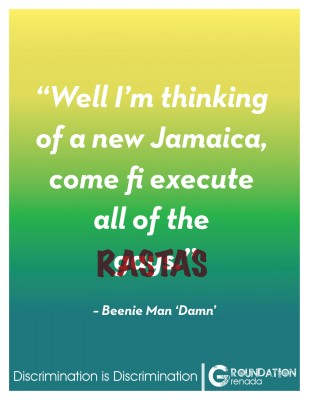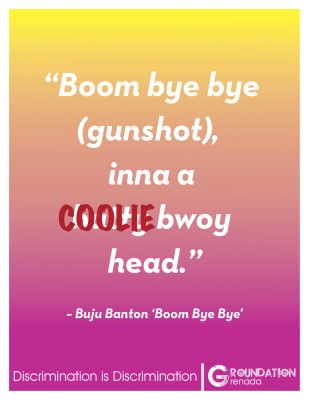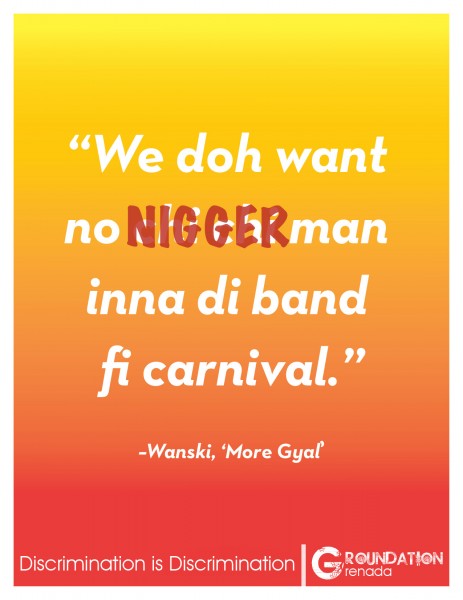Our campaign -‘Discrimination is Discrimination’ – addresses the fact that most people in the Caribbean reject other forms of arbitrary discrimination; they understand why it is problematic and toxic for our societies. Sadly, the same understanding isn’t extended to discrimination based on sexual orientation and/or gender identity (SOGI). This is not to say that all forms of discrimination are the same or operate the same. There are, however, crucial parallels between various forms of discrimination that are often ignored. Our campaign visually juxtaposes discriminatory remarks in popular media in a way which makes the parallels apparent.
Some quotes from the GV interview include:

Groundation Grenada (GG): We’ve received both positive and negative feedback. The negative feedback consists primarily of what I perceive as closet homophobes emphasising the differences between discrimination based on sexual orientation/gender identity and race. Some are attempting to belittle the negative discriminatory experiences of Lesbian, Gay Bisexual, Transgender and Queer (LGBTQ) people or suggesting that it falls below issues of race in some ‘discrimination hierarchy'. Some of our allies thought we should have included more text, making it explicit that we are against all forms of discrimination and explaining our campaign more because they felt that people may have misconstrued our intentions and thought we were advocating other forms of discrimination, thereby offending some viewers. We understand this, but we think that people will get the message without us having to be explicit. The title of the campaign, ’Discrimination is Discrimination’, helps to contextualize what we are trying to say. The ultimate message is that sexual orientation/gender identity discrimination is as bad as other forms of discrimination and while there is a shock value to the posters, we think by and large people conceptually understand our message. Otherwise, the feedback has been quite positive and individuals and organizations have been sharing the campaign across their social media platforms.



We wanted to use Caribbean relevant lyrics that many people, and particularly, a youth demographic, would identify with so that people would see how easily we normalise expressions of violence and expressions of discrimination against LGBTQ people and how much we are culpable in that normalisation. We wanted people also to interrogate why they were able to morally excuse lyrics which promote violence and discrimination against LGBTQ people and by extension, why they thought of sexual orientation/gender identity as different from other forms of discrimination, the expressions of which they would never endorse. The popularity of the lyrics was crucial to the campaign. The Indo-Caribbean woman who was jumping in a carnival band and singing Wanskie’s song must now be forced to think about her prejudices; same with the black man in the club singing Buju’s tune. They both may have experienced being discriminated against, depending on their other contexts, they would now be forced to think about the ways they endorse other forms of discrimination.
I think homophobia in the Caribbean is fueled by many things and that people are socialised into being homophobic. Children and people generally living in a space are constantly exposed to expressions of the values and attitudes of that space, which in many cases are internalised. Homophobia as a package is part of the value and attitude system of the Caribbean, expressed in many fora, including in popular media and internalised by people who don’t think about it critically. So popular media plays its part in fueling homophobia in so far as it parades value systems that are internalised. But we have to remember that the music reflects society. Families fuel homophobia a lot more than popular media does in my view.

We are also organising ‘Groundation Radio’, a blog radio program to expand our platform and improve our outreach. We continue to publish creative and critical pieces from Caribbean and diasporic thinkers and writers on our website. See the full interview HERE from Global Voices.
Two cents:
I kinda like the idea or the replacement of offending lines in previous anti gay targeted materials but my call from back in the day still resounds, if theses artists want to reflect true change then they MUST discontinue or remove said offending materials from their repertoire altogether not just stop performing them to look good or to reduce the pressure placed on them by the lobby. They are still earning from the materials as with every click on sites as iTunes and so forth they need not perform the tunes to appease the gay lobby but profit from the tracks' availability none the less.
Remember that half hearted apology from Beenieman only to turn out to be a farce?
see:
Beenieman Says apology to gay community had no influence in his return to performing in the US
Not Impressed!!!! Beenieman ................... artist supposedly backtracks on gay stance but we must also be reminded of the overkill or overeach by advocates as well that can sometimes lead to a black eye for the lobby's goals that are genuine and not self serving for some powerful individuals in the mix)
see:
Queen Ifrica's "Freedom of Speech" & advocacy found wanting
Peace and tolerance
H

.jpg)




















.png)








.mkv_000108708.jpg)
.mkv_000109059.jpg)
.mkv_000113988.jpg)
















+(Light).jpg)








































No comments:
Post a Comment